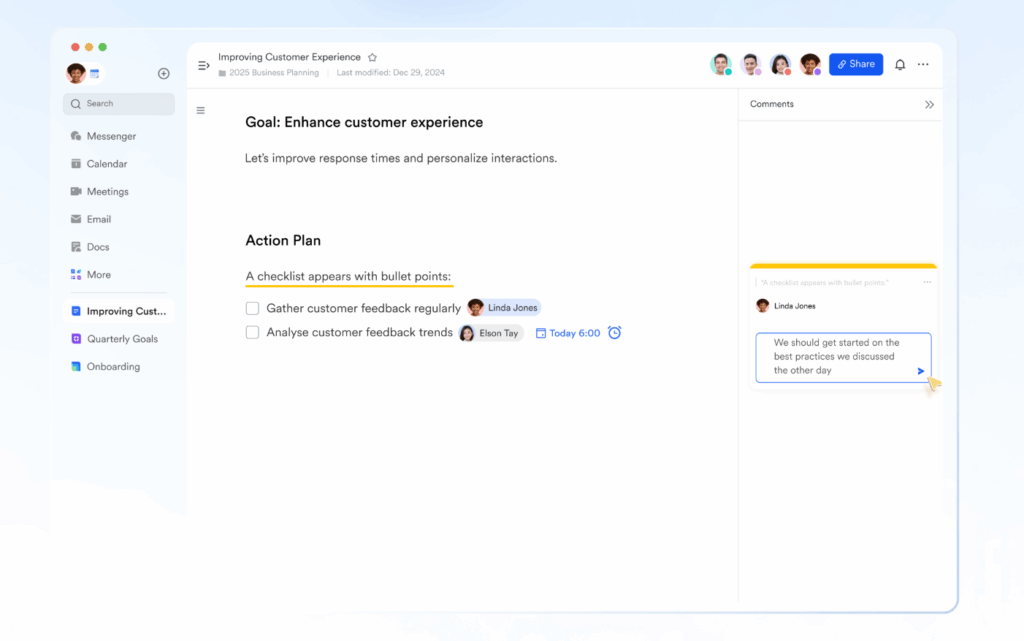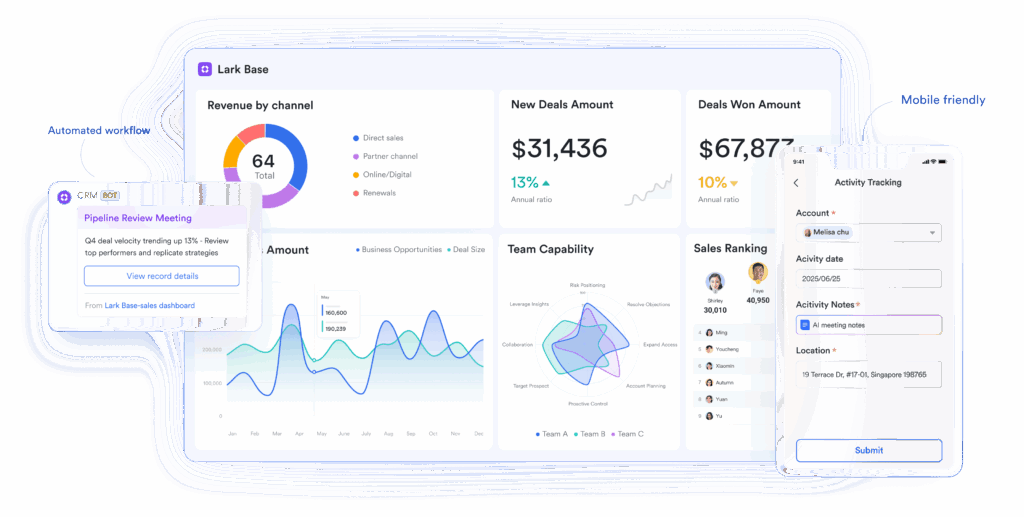Every workplace relies on knowledge: policies, project histories, strategy data, training materials, and decisions that impact daily work. In many workplaces, however, all of that knowledge is scattered. A document is stored on one manager’s laptop, a bunch of guidelines is buried in an email thread, and lessons learned from the project are captured on a deck that is never revisited. When knowledge is fragmented like this, employees then spend more time looking up information than they do working, and productivity declines.
This is where modern project management tools are valuable. These tools are not just about managing tasks, but they provide a framework for storing, sharing, and building of knowledge so that teams move with confidence. Lark was built with this philosophy, providing workspace where your information lives in one place, and anyone that needs it is able to access it. The result is less ambiguity, less repeated mistakes, and better performance as a collective.
Building a living library with Lark Wiki

One way the lack of a central repository is most evident is when new employees start with the organization. They do not have access to a succinct onboarding guide on what to do when they start, so they spend their time asking colleagues for answers and digging through outdated folders for relevant processes. The same inefficiency and frustration exists for employees who have been with the organization for some time. They generally have a sense of what they should do, but rather than relying on documented procedures, they waste time reconstructing how they used to do things.
Lark Wiki provides a solution to this issue. It houses institutional knowledge in one repository that is searchable and publicly available to access. You can publish policies, training manuals, playbooks, and reference guides as Wiki pages, and you get to choose how best to organize and access those pages. Instead of learning by trial and error or interrupting a colleague, employees can find the answers they need immediately. Over time, a Wiki will be a growing library of institutional knowledge, and reduce employees’ reliance on their memory and utilize the expertise of the entire organization.
Lark Docs keeps collaboration anchored in clarity

Knowledge doesn’t begin in finished, referential form; it begins in documents that bundle up ideas in draft form and trace the evolution of those ideas. If those drafts exist in attachments or disparate versions, collaboration slows down, and any institutional learning disappears.
Lark Docs keeps documents together. Teams can co-edit, in real time, comment in line, and have one version they can all trust. When a proposal or report is complete, it can be pushed into Wiki for future reference. Lark Docs’ design makes a clear connection between live collaboration and archiving. Knowledge survives not only for the current project, but it also provides fuel for the next.
Lark Messenger as the fast track to context
One of the hidden challenges of fragmented knowledge is that conversations happen separately from documentation. A critical detail might be agreed upon in chat but never makes its way into the shared file. Weeks later, decisions are revisited because no one can remember where they were written down.
Lark Messenger prevents these gaps. Threads keep discussions organized, and messages can be linked directly to Docs. If a decision is made in conversation, it doesn’t disappear—it becomes part of the official record. This direct bridge between communication and documentation ensures that context is preserved, even when projects move quickly.
Lark Calendar ties information to time

Knowledge isn’t just about “what” was decided—it’s also about “when.” Teams often lose productivity not because they lack information, but because they fail to connect it to schedules. A finalized plan might exist in a document, but if deadlines aren’t visible, execution falters.
Lark Calendar integrates documents and decisions into daily workflows. Review dates can be linked to Docs, reminders surface when guidelines need updates, and milestones remain visible across teams. By tying information to time, Calendar ensures knowledge doesn’t sit in static files—it actively guides execution.
Accountability through Lark Tasks
A knowledge hub doesn’t work unless it translates into action. Too often, policies or strategies exist but no one feels responsible for maintaining them, leading to outdated or ignored information.
Lark Tasks makes accountability explicit. A knowledge update can be tracked as a task, with ownership, deadlines, and visibility built in. Whether it’s refreshing onboarding content or updating compliance policies, tasks ensure the hub remains current. Tasks can be linked to Docs, while Docs can be stored in Wiki. This collaboration ensures accountability is clear, keeping knowledge reliable and trusted.
Lark Base brings structure to knowledge-driven workflows

Without structure, even the best knowledge hub risks becoming a static library that people forget to use. What organizations need is a way to integrate knowledge directly into processes so it drives consistent outcomes.
Lark Base provides that foundation. Teams can build workflows—tables, Kanban boards, or timelines—that connect to Docs and Wiki records. Automation eliminates repetitive steps like notifying teams when a policy updates or logging review outcomes. This reflects the function of business process management software: turning scattered knowledge into systematic, repeatable processes. With Base, information isn’t just stored—it actively shapes the way work gets done.
Conclusion
Without a knowledge hub, teams waste time, duplicate efforts, and rely too much on memory. Productivity falters not because employees aren’t trying, but because they don’t have the information they need when they need it.
Lark’s answer is the hub. Wiki is the hub, Docs supports collaboration, Messenger carries context to records, Calendar ties information to time, Tasks reinforce responsibility and accountability, Meetings memorialize decisions, and Base provides the infrastructure to scale. Together, they align to ensure knowledge doesn’t dissipate and dematerialize—it grows stronger and accelerates the company.
To push a step further, organizations can tie their internal knowledge work to customer-connected processes through a CRM app. By making customer histories, interactions, and perspectives part of the same integrated experience, companies strengthen their knowledge hub in a way that serves both internal teams and the relationships that enable growth.
